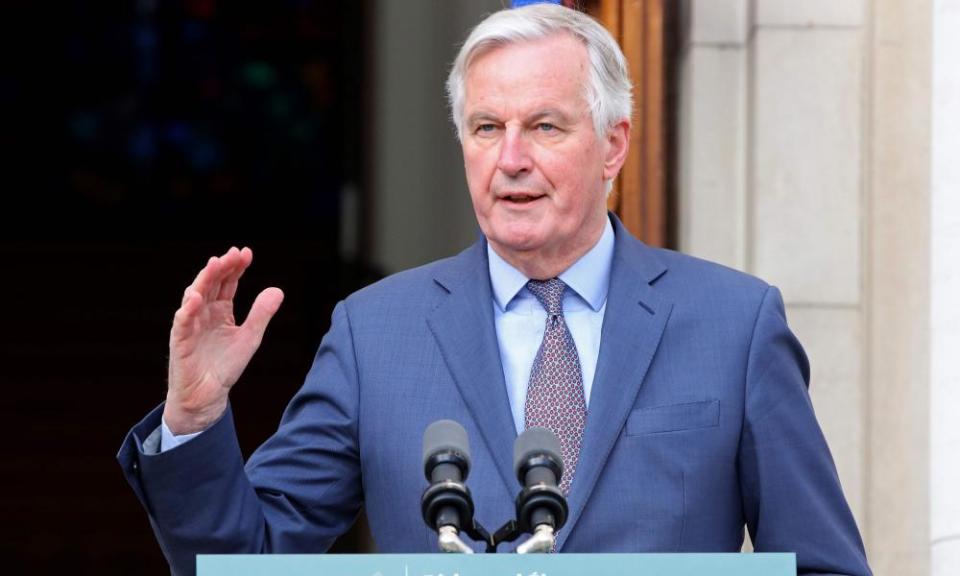Barnier refutes Johnson's claims over Irish Sea trade checks

The EU has rejected Boris Johnson’s claims that there will be no checks on goods going from Great Britain to Northern Ireland after Brexit, with Michel Barnier warning such checks are not dispensable.
Days after the prime minister said there would “emphatically” be no checks on trade across the Irish Sea, the EU’s chief negotiator told an audience in Belfast that the UK had agreed to them as part of a “creative and flexible” solution to the Irish border question.
There was no provision for ignoring them in the legal test of the withdrawal agreement, Barnier said in a speech in Queen’s University: “In agreeing the [Northern Ireland] protocol, the UK has agreed to a system of reinforced checks and controls for goods entering Northern Ireland from Great Britain.”
Related: Brexit talks: UK warned it faces tough challenge against 'team EU'
“The text is very precise. I always tell the truth,” Barnier said in response to questions from the media on whether checks could be lifted. When asked how he felt about Johnson’s repeated claims there would be checks, he replied: “I know what is written in this text.”
In his speech, he said: “I understand the fears of negative economic fallout expressed by some about these checks, but Brexit unfortunately has consequences that we must manage.”
He said it was the UK’s decision to quit the single market and customs union, and that “makes checks indispensable”.
His comments, in a keynote speech at Queen’s University, are a direct contradiction of the prime minister’s repeated claims over the last three months that there would be no checks on goods in either direction across the Irish Sea.
At one point Johnson told supporters in Northern Ireland that they could put any new paperwork “in the bin” because there would be “no forms, no checks, no barriers of any kind” on goods crossing the Irish Sea after Brexit.
He repeated the claim again last week, telling Sir Jeffrey Donaldson, the Democratic Unionist party leader in the House of Commons, that it was “emphatically” the case there would be unfettered trade in either direction across the Irish Sea.
His claims have led to confusion among business leaders in Northern Ireland. Last week the Freight Transport Association warned that the “straightforward” paperwork that would be needed post-Brexit for goods transiting from Northern Ireland to Great Britain involved a complex form with more than 30 questions.
He said many of the consequences were “not so well explained to the British people”.
“There will be no possibility for frictionless trade between the EU and UK after this deal”.
Goods going in the other direction must be accompanied by customs declarations forms with “phyto-sanitary checks on food products and live animals”.
Barnier warned that neither the EU or UK could not backslide by simply turning a blind eye. The withdrawal agreement was legally binding and “cannot be re-opened under the guise of implementation”. “We will be monitoring its correct application very carefully,” he said.
Barnier also expressed bemusement over Sajid Javid’s recent remarks in a Financial Times interview that the UK would not be aligned to EU rules post-Brexit.
He said he hoped “our UK friends are reflecting carefully” on the matter because the EU will not agree to a close neighbour trying to seek an unfair advantage through subsidies to industry or a removal of stringent standards to cut costs.
“The UK cannot expect high-quality access to our single market if it insists on competing on state aid, social or environmental standards,” he said.
After a whistlestop tour of Dublin and Belfast, in which he met the taoiseach and representatives of Sinn Fein and the DUP, Barnier said that the withdrawal agreement in its current form allows for “an orderly Brexit, for now” that “limits the destruction of value of our citizens and businesses”.
As the EU and the UK count down to the formal parting of company on Friday, Barnier warned a “new clock was ticking” with just 11 months to seal a deal on trade and other issues including freedom of movement, science, Erasmus, security and financial services.
After a meeting with Barnier in Dublin, the taoiseach Leo Varadkar expressed sadness that Ireland’s nearest neighbour was no longer a member of the EU family.
“We’ll say goodbye to an old friend embarking on an adventure,” said Varadkar. “We hope it works out for them. But if it does not, there will always be a seat kept for them at the table.”

 Yahoo News
Yahoo News 